China is well on its path to dominate global trade, but when it comes to soft power, the country is sadly lagging behind its other rivals in the East Asian cultural sphere in exporting its commercial pop culture to other countries. Ask any Iranian on the street about their knowledge of Japan, for example. They would tell you about Haruki Murakami or Kazuo Ishiguro if they are the reading type; or Hayao Miyazaki if they like Japanese animations (or ‘Death Note’ if they watch too many anime); there is even a chance – small as it may be – that they will tell you about Konami, Hideo Kojima or Final Fantasy if they are the gaming type. With South Korea, we had a golden era of Korean TV series; I don’t think you can find many people in Iran who would look in confusion if you tell them about Jang-Geum – the lead actress in ‘A Jewel in the Palace’; I have even met a few Iranian people who were K-pop fans.
But when it comes to the Chinese pop culture, that’s where many – if not all – draw a blank; one reason may be that China isn’t trying too hard to create the kind of content in the music, cinema or book industry, that could be internationally competitive. The large population of China may have played a part in turning the focus of cultural products inward, on domestic consumers. Another reason may be the struggle to move past the negative Chinese stereotypes, as promoted throughout the US history. The government’s strong sway over China’s cultural sphere may also be another reason for the lack of Chinese cultural products in the world's mainstream.
I would say Iran has fared just a little bit better than China in exporting its cultural products. Looming politics overshadow cultural activities; still, the Iranian cinema has been worming its way, slowly but surely, into the hearts of cinema goers across the world through the painstaking efforts of Abbas Kiarostami and Asghar Farhadi. Our contemporary literature is still obscured by the overwhelming greatness of our ancient literature. Our classic music is an acquired taste, and the pop music is favored mostly by the Iranians themselves.
“Cultural exchange is the real exchange,” says Ms. Gulinaer Wulfuli, Professor of the Kashgar University, who is visiting Iran as part of a cultural delegation from China's Xinjiang Uygur Autonomous Region. And I might be biased, but I have to agree with her on that.
The Chinese delegation, which held a press conference at the Chinese Embassy in Tehran on Monday, was headed by Xu Guixiang, vice secretary-general of the Chinese Overseas Friendship Association, who says the visit to Iran aims at introducing Xinjiang and enhancing cultural and people-to-people exchanges.
Mr. Guixiang describes Xinjiang as the largest Chinese administrative division, spanning over 1.6 million km2 – a staggering area when you realize this northwest city is just as big as the whole country of Iran.
I ask him about the progress of Iran-China’s cooperation in the 'One Belt- One Road’ project.
The ‘One Belt- One Road’, or OBOR, or the Silk Road project as mostly known in Iran, is for the most part, a mega infrastructure project dedicated to promoting transport and energy development plans in the countries along the new Silk Road routes. The project is valued at about $5 trillion, spanning over 60 countries across Asia, the Middle East, Europe, and Africa. Iran is one of those countries that have signed up for the project.
“Iran and China’s cooperation in OBOR is highly significant in terms of humanistic values and people-to-people exchanges,” he says. “I feel that there is more potential for cooperation in this field. The two countries have such rich resources for cultural and people-to-people interactions. The OBOR is one of the many advantages presented by this cooperation between Iran and China.”
“We, as part of this cultural delegation, have drawn up a number of projects within the OBOR framework, such as ‘The Scent of Books’. The project invites countries along the new Silk Road routes to translate their books into the language of one another.”
He maintains that the US pullout from the JCPOA and the subsequent possibility of imposing old and new sanctions will not affect Iran-China’s cooperation in OBOR. “It’s because the relations between Iran and China go back to thousands of years. The friendship between the people of the two countries are very deep.”
“China welcomes the efforts made by regional countries towards the promotion of national unity. China plays a significant role in maintaining the peace and stability in the region. The development of ties between Iran and China amid a peaceful and stable region will serve the interests of both countries,” he says.”
What he says about ‘The Scent of Books’ project intrigues me. The idea of organizing a group of translators to engage in promoting the literature of the countries which have signed up for OBOR definitely holds a lot of merit. Especially considering that China will be the Guest of Honor at the 2019 Tehran International Book Fair; an occasion that will give China a good opportunity to introduce its cultural and literary products to the Iranian public.
“This will be a good opportunity to display the history and culture of China,” says Mr. Xu Guixiang. “China is very keen on participating at this cultural event, to present top Chinese books to the Iranian book lovers. I will talk to relevant organizations back at home about my proposals and suggestions regarding this matter.”
I shift the discussion to China’s influence, or lack thereof, in today's cinematic trends across the globe. Mr. Xu Guixiang, however, believes that Chinese TV series have their own influence in foreign countries. “When I turned on the TV back at my hotel, I saw an Iranian channel was broadcasting a Chinese show. But of course, China has a long way to reach the level its vast potentials demand. More cultural exchange is needed to help China spread its pop culture and appeal among the Iranian people. When I go back, I will call on relevant organizations at home to have more interactions with Iran in the cultural sphere.”
Still, the China image that the world gets to see comes, not from Chinese drama series, but from the American ones. I ask him if he has watched ‘Mr. Robot.’
“No, I haven’t. What is it about?”
So I launch into an enthusiastic description of one of my most favorite TV shows: It’s an American drama series in which a Chinese cyber-terrorist also serving as China's Minister of State Security leads a series of cyberattacks as the head of the Dark Army against the US largest conglomerate, Evil Corp, with an intention to sway the UN vote in favor of China’s annexation of The Congo, and hurting the US economy in the process. I also mention how the series made it look like China was behind Trump’s election victory, as contrary to the mainstream opinion in Western media that puts the blame on Russia.
“That’s some absurd imagination,” he sounds shocked by my description of 'Mr. Robot', and I wonder if I should have also told him about how this Chinese character ends up blaming the cyberattacks on Iran because it’s a believable story in Western media. “We Chinese never intervene in the domestic affairs of other countries. About Russia’s dealings with the US, I don’t know anything about that either.”
I catch up with Ms. Gulinaer Wulfuli later, who has more to say about Iran and China’s exchanges in the literary sphere.
“A lot of Persian titles have been translated into Chinese, such as Rumi’s 'Masnavi', Ganjavi’s 'Layla and Majnun', and Ferdowsi’s 'Shahnameh',” she says. “Persian language is also being taught at some universities in China, most notably Peking University and Shanghai International Studies University.”
“China has a comprehensive program for introducing the culture and literature of Iran to Chinese people.” But the focus is still on academics, and I want to know how much a random Chinese person on the street can tell you about Persian literature if they haven’t studied the course at university.
Rumi, for example, is particularly popular with the West. His somber quotes on Tumblr get a lot of notes (most notably: ‘The wound is the place where the Light enters you.’ Or, ‘Don’t grieve. Anything you lose comes round in another form.’). Ms. Wulfuli says, however, that Rumi has not yet become integrated in China’s pop culture, and his full sway is still focused on academic circles and over literary figures and researchers.
“The 'One-Belt One-Road' project is expected to introduce the Persian literature and culture more and more to the Chinese nation,” she adds.
I ask if the OBOR vision is to take the love for Persian literature out of the academic monopoly and bring it among the ordinary people.
She is hopeful about that prospect and says OBOR has an aim to “build a human community with shared destiny”; a concept which embodies a hope for an open, inclusive, and beautiful life for everyone in the world.
“One of the exchanges among countries along the Silk Road routes is a cultural one, beside the economic and trade cooperation,” She says. “This exchange includes sharing books and poetry of each nation. Xinjiang acts as a bridge through which China exports its culture and in turn, receives other countries’ cultures. This route introduced so much of the Iranian culture to us. I believe that in future, Iran and China will have so much more cultural cooperation under the OBOR project.”
Two factors that are likely to bring a foreign book into focus of Iranian book readers is that if the book has won a major literary award, and if it has already been translated into English.
She says a Chinese writer has actually won a Nobel Prize, but does not name him. It is actually Mo Yan, the writer of 11 novels, several novellas and short story collections, who received the prestigious literary award in 2012. His case proves my point about literary prizes being one of the deciding factors for prompting Iranian translators into giving a book some consideration: none of Mo Yan’s books had been translated into Persian before he won the Nobel Prize. I have only seen the Persian translations of his ‘Red Sorghum’ and two short story collections titled something like ‘Stop This Nonsense, Avesta’, and ‘The Calf and the Endurance Runner’ [I might be completely off the marks with these titles, seeing how the collections are actually a selection of the translator’s personal favorites and not enlisted as such in the writer’s bibliography.]
At any rate, Ms. Wulfuli says that the ‘Scent of Books’ project will be an effort to get the Iranian people more familiar with Chinese contemporary literature.
I can’t wait for the project to get underway.


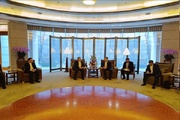
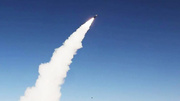



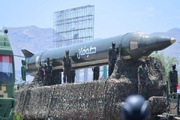
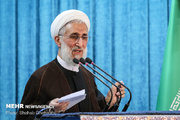






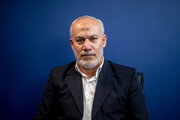


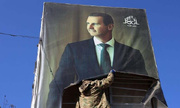

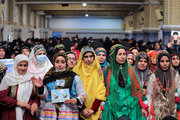
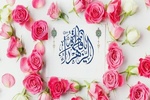

Your Comment